

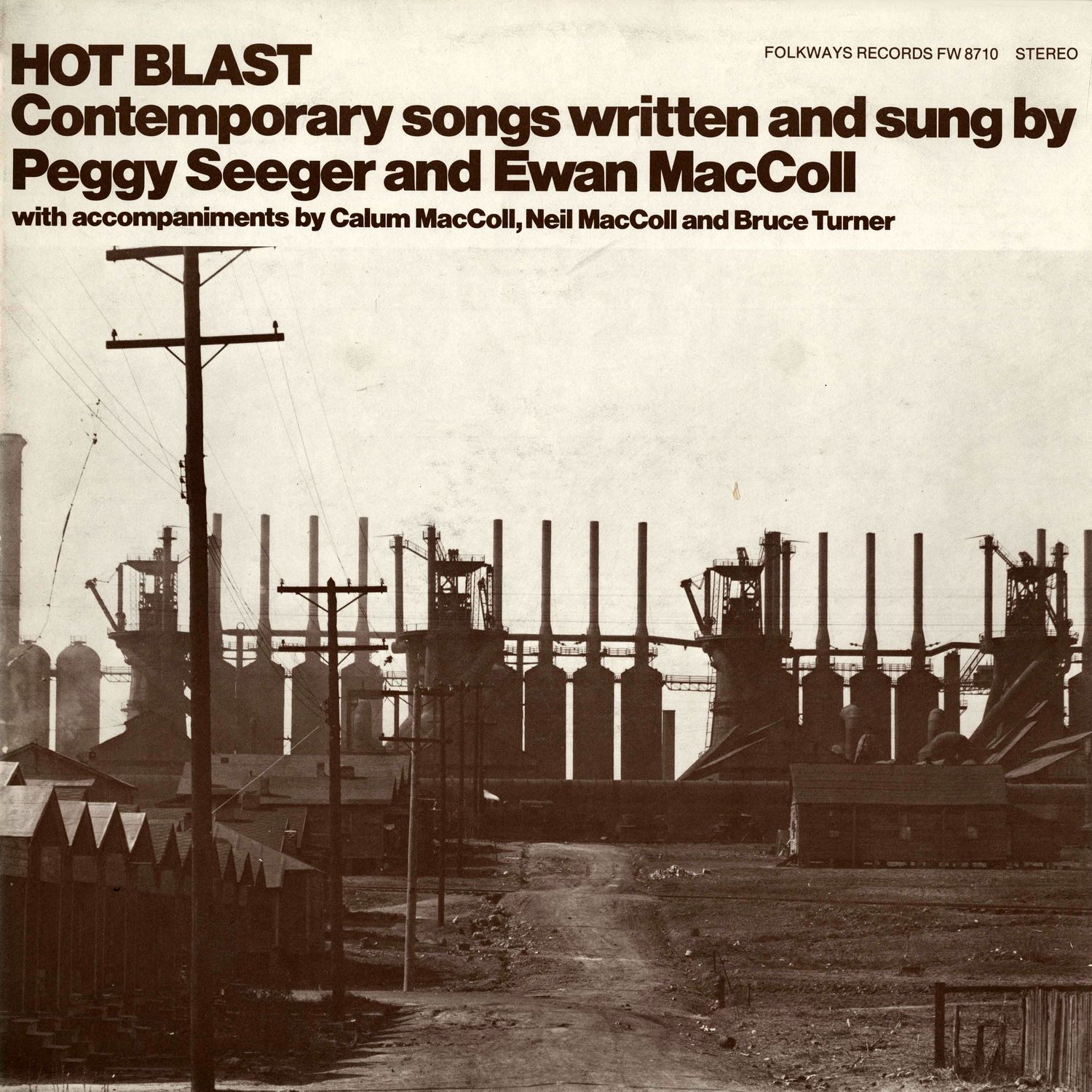 |
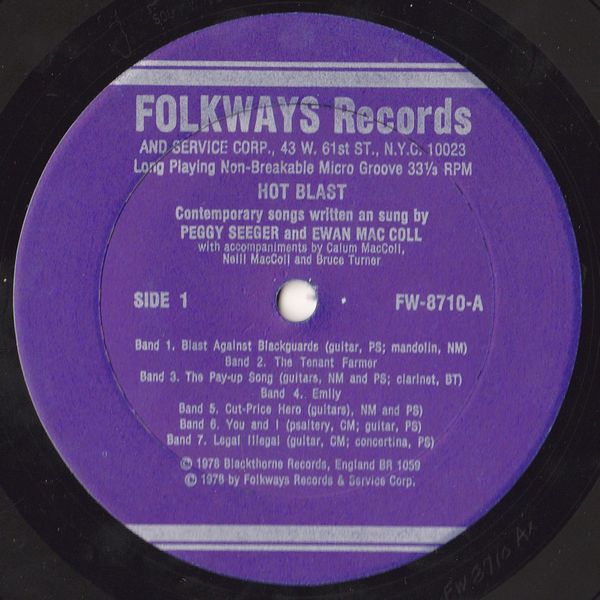
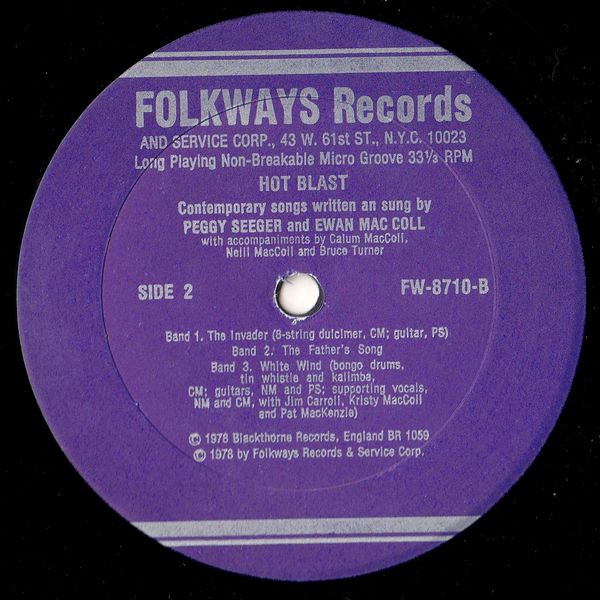
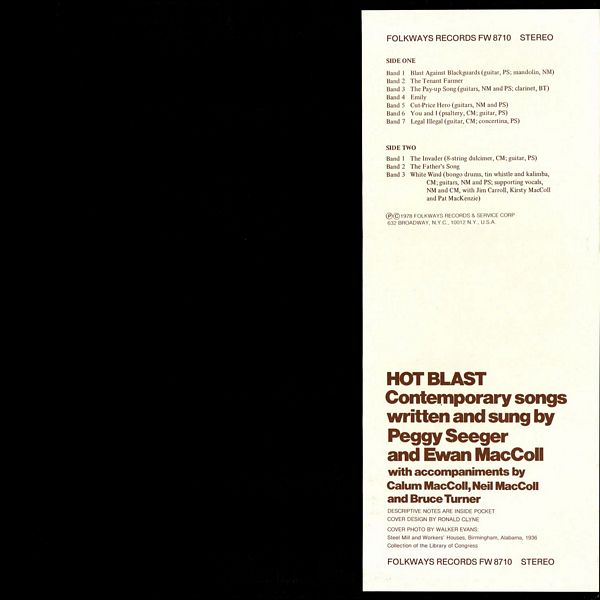
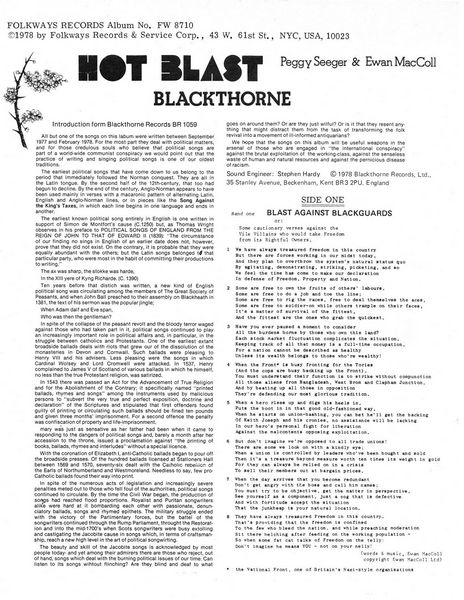 |
Sleeve Notes
Introduction from Blackthorne Records SR 1059
All but one of the songs on this labum were written between September 1977 and February 1978. For the most part they deal with political matters, and for those credulous souls who believe that political songs are part of a world-wide communist conspiracy we would point out that the practice of writing and singing political songs is one of our oldest traditions.
The earliest political songs that have come down to us belong to the period that immediately followed the Norman conquest. They are all in the Latin tongue. By the second half of the 12th-century, that too had begun to decline. By the end of the century, Anglo-Norman appears to have been used mainly in verses with a macaronic pattern of alternating Latin, English and Anglo-Norman lines, or in pieces like the Song Against the King's Taxes, in which each line begins in one language and ends in another.
The earliest known political song entirely in English is one written in support of Simon de Montfort's cause (C.1250) but, as Thomas Wright observes in his preface to POLITICAL SONGS OF ENGLAND FROM THE REIGN OF JOHN TO THAT OF EDWARD II (1839): The circumstance of our finding no sings in English of an earlier date does not, however, prove that they did not exist. On the contrary, it is probable that they were equally abundant with the others; but the Latin songs belonged t4 that particular party, who were most in the habit of committing their productions to writing.
The ax was sharp, the stokke was harde,
In the XIII yere of Kyng Richarde. (C. 1390)
Ten years before that distich was written, a new kind of English political song was circulating among the members of The Great Society of Peasants, and when John Ball preached to their assembly on Blackheath in 1381, the text of his sermon was the popular jingle;
When Adam dalf and Eve span,
Who was then the gentleman?
In spite of the collapse of the peasant revolt and the bloody terror waged against those who had taken part in it, political songs continued to play an increasingly important role in political affairs and, in particular, in the struggle between catholics and Protestants. One of the earliest extant broadside ballads deals with riots that grew our of the dissolution of the monasteries in Devon and Cornwall. Such ballads were pleasing to Henry VIII and his advisers. Less pleasing were the songs in which Cardinal Wolsey and Lord Cromwell were attacked. In 1537, Henry complained to James V of Scotland of various ballads in which he himself, no less than the true Protestant religion, was satirized.
In 1543 there was passed an Act for the Advancement of True Religion and for the Abolishment of the Contrary; it specifically named printed ballads, rhymes and songs among the instruments used by malicious persons to subvert the very true and perfect exposition, doctrine and declaration of the Scriptures and stipulated that first offenders found guilty of printing or circulating such balladS should be fined ten pounds and given three months' imprisonment. For a second offence the penalty was confiscation of property and life-imprisonment.
Mary was just as sensative as her father had been when it came to responding to the dangers of political songs and, barely a month after her accession to the throne, issued a proclamation against the printing of books, ballads, rhymes and interludes without a special licence.
With the coronation of Elizabeth I, anti-Catholic ballads began to pour off the broadside presses. Of the hundred ballads licensed at Stationers Hall between 1569 and 1570, seventy-six dealt with the Caiholic reoeliion of the Earls of Northumberland and Westmoreland. Needless to say, few proCatholic ballads found their way into print.
In spite of the numerous acts of legislation and increasingly severe penalties meted out to those who fell foul of the authorities, political songs continued to circulate. By the time the Civil War began, the production of songs had reached flood proportions. Royalist and Puritan songwriters alike were hard at it bombarding each other with passionate, denunciatory ballads, songs and rhymed epithets. The military struggle ended with the victory of the Parlimentary forces, but the battel of the songwriters continued through the Rump Parliament, throught the Restoration and into the mid-1700's when Scots songwriters were busy extolling and castigating the Jacobite cause in songs which, in terms of craftsmanship, reach a new high level in the art of political songwirting. The beauty and skill of the Jacobite songs is acknowledged by most people today — and yet among their admirers there are those who reject, out of hand, songs which deal with the burning political issues of our time.
Can listen to its songs wihtout flinching? Are they blind and deaf to what goes on around them? Or are they just wilful? Or is it that they resent anything that might distract them from the task of transforming the folk revival into a movement of ill-informed antiquarians?
We hope that the songs on this album will be useful weapons in the arsenal of those who are engaged in the international conspiracy against the brutal exploitation of the working-class, against the senseless waste of human and natural resources and against the pernicious disease of racism.